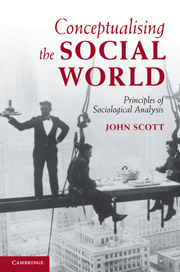Book contents
- Frontmatter
- Contents
- Figures
- 1 Diversity and Continuity in Social Theory
- 2 Culture: the Socialisation of Meaning
- 3 Nature: Conditions and Constraints
- 4 Systemic Processes: Regulation and Control
- 5 Space-Time: Forms and Practices
- 6 Social Structure: Institutions and Relations
- 7 Social Action: Interpersonal and Collective
- 8 Subjects: Socialised Minds
- 9 Social Development: Differentiation and Change
- 10 Conclusion
- Notes
- References
- Index
3 - Nature: Conditions and Constraints
Published online by Cambridge University Press: 05 June 2012
- Frontmatter
- Contents
- Figures
- 1 Diversity and Continuity in Social Theory
- 2 Culture: the Socialisation of Meaning
- 3 Nature: Conditions and Constraints
- 4 Systemic Processes: Regulation and Control
- 5 Space-Time: Forms and Practices
- 6 Social Structure: Institutions and Relations
- 7 Social Action: Interpersonal and Collective
- 8 Subjects: Socialised Minds
- 9 Social Development: Differentiation and Change
- 10 Conclusion
- Notes
- References
- Index
Summary
Human beings are the products of their culture, but they are also the products of their nature. They exist as biological organisms that live in particular physical environments on which they depend and which they transform. Human behaviour cannot be understood without taking account of this natural basis, and some have argued that nature must be seen as the primary determinant of human behaviour. For these material determinists, culture is all-but irrelevant as human freedom of choice is so tightly constrained by the material conditions under which it is exercised. Against this, most cultural analysts have held that culture is able to transform nature through its ‘cultivation’. Some have gone so far as to suggest that culture has the capacity to override nature altogether and that all human life is a result of processes of social construction operating alone. Neither form of determinism – material or cultural – can be sustained, and I seek to show in this chapter that social theorists have moved towards a recognition of the interdependence of nature and culture and an explanation of the mechanisms of interdependence.
- Type
- Chapter
- Information
- Conceptualising the Social WorldPrinciples of Sociological Analysis, pp. 39 - 85Publisher: Cambridge University PressPrint publication year: 2011

